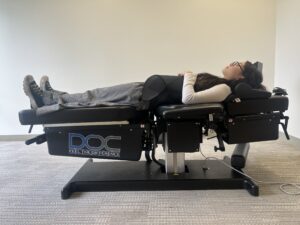At any given moment, 23% of the world’s adults are experiencing chronic low back pain. 84% of adults will suffer with the condition during their lifetimes. It impacts their ability to work, socialize, and enjoy a quality of life.
Many turn to acupuncture for back pain treatment. But like any respected ancient alternative healing practice, it’s essential to understand what acupuncture can and can’t do—according to the science. This will allow you to get the most out of your sessions.
Is Acupuncture Good for Back Pain?
Many people who have back pain benefit from acupuncture. Studies have shown that It can be a safe and effective way to manage both acute and chronic back pain if performed by a licensed acupuncturist who understands how this ancient Chinese medicine practice works.
A review of over 30 clinical trials and studies by scientists asked the question, “will acupuncture help back pain?” They found “moderate-certainty evidence” that when compared to no treatment, “acupuncture produced greater and clinically important pain relief {and} improved back function.” with no reported “adverse events”.
Does It Work for Chronic Back Pain?
Acupuncture can be an important tool for managing pain, especially in the short term. It relieves the immediate discomfort without medication while you address the root cause of that pain over the longer term. Depending on the cause of pain, this alternative therapy can be combined with other methods like nutrition therapy, ultrasound therapy, disc herniation treatment, home exercise, Graston therapy, and chiropractic adjustments to optimize your body’s natural healing ability and experience longer-term relief from pain.
These sessions can complement conventional medicine back pain treatments as well. They can eliminate the need for addictive pain medications or lower the dose needed, reducing the risk of dependence while a back injury heals.
Those with chronic back pain know how debilitating the pain can be. It makes it hard to do anything, including taking action to treat the cause of the pain. So, a person often tries to move as little as possible, and the pain worsens. Acupuncture gives people a relief window to take the actions needed to experience longer-term relief.
Want to learn more? You may also like:
What Does Acupuncture Do for Back Pain?
An acupuncturist inserts single-use, ultra-thin needles into specifically mapped-out points on the body to redirect the energy flow. This directly disrupts pain signals and activates the body’s natural healing processes. It also starts a chain reaction of stress-reducing chemicals in the brain, which can both improve your mental state and cause your back to temporarily “let go” of tension that may be contributing to your pain.
For example, you have four low back pain points on one either side of the lumbar spine (lower back) about two fingers width from the spinal column. You have two additional low back pain points on your feet. These are two fingers width up from the base of the big and second toe, resting between the toe bones.
And while it might sound strange, studies show acupuncture in the ear for back pain can also reduce pain intensity. This is a common addition to the therapy.
Other types include:
- Acupuncture for upper back pain
- Acupuncture for back pain sciatica
- Acupuncture for back nerve pain
In each case, they have specific points to target.

What Are the Benefits of Acupuncture for Back Pain?
Acupuncture benefits for back pain include:
- Disrupting pain signals
- Decreasing back pain intensity
- Stimulating the nervous system to promote healing
- Reducing chronic inflammation
- Activating the body’s natural release of pain-reduction chemicals
- Improving mood (which can reduce back tension)
- Temporarily reducing pain to allow time for longer-term treatments to work
- Complementing conventional medicine
- Reducing the need for pain medications and the risks associated
- Reducing the need for surgery (if you take action to reduce the cause of your pain during your relief windows)
To experience the benefits of acupuncture, schedule an initial consultation for evaluation and first treatment.
Any Side Effects?
Side effects are typically mild and resolve within minutes to hours. They include site redness, irritation, pricking discomfort, and slight bleeding. More adverse events are extremely rare and unheard of when acupuncture is administered correctly by a licensed professional using single-use needles. Wait a few hours to work out after acupuncture since the needle sites could bleed, if stimulated.
How Long Does Acupuncture Last for Back Pain?
When receiving this treatment, most will experience significant relief for 24 to 36 hours, after which the discomfort may slowly return. Most can move more freely during the pain relief window, maintain a stretching routine, and complete complementary therapies to achieve longer-term relief. But every situation differs. We can discuss this with you during your acupuncture consultation.
How Many Sessions of Acupuncture for Back Pain?
Most people with acute and chronic pain will have noticeable improvements after two to three sessions.
But all back pain is not the same. So, how many acupuncture sessions are needed for back pain varies. Depending on what’s causing your condition, it may take multiple visits to experience initial relief and activate your body’s natural healing processes to eliminate back pain more fully.
Even after the pain is gone, it’s vital to keep acupuncture and chiropractic maintenance sessions. These allow your chiropractor to evaluate and adjust your back’s alignment and overall health. Ideally, those who do heavy lifting or sit for long periods need to have a chiropractic adjustment every two weeks for maintenance to reduce the risk that the pain intensity returns.
How Often Should I Have Acupuncture for Back Pain?
Most people will benefit from two to three sessions a week for severe symptoms. Once the root cause is addressed, and the back is allowed to heal, you may need fewer sessions to maintain your progress.
Keep reading to learn about how chiropractors treat low back pain. Schedule your first acupuncture session to start getting results.



